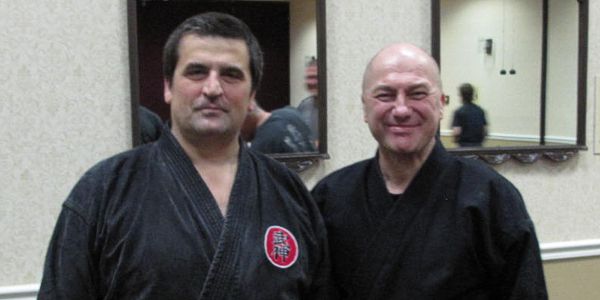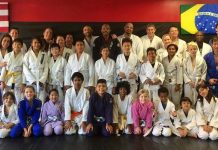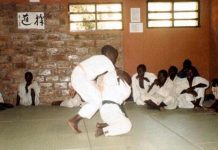 Studying the way of the sword is an undertaking that demands perfectionism of the practitioner. It is not simply that an edged weapon is unforgiving of gross errors, but that the entire mind/body must be integrated and focused with a laser-like coherence. Less than this results not in swordsmanship, but an approximation of it.
Studying the way of the sword is an undertaking that demands perfectionism of the practitioner. It is not simply that an edged weapon is unforgiving of gross errors, but that the entire mind/body must be integrated and focused with a laser-like coherence. Less than this results not in swordsmanship, but an approximation of it.
 The “Koppo of Ken II” seminar with Mark Lithgow, hosted by Shihan Phil Legare of the Bujinkan was a potent learning experience that cast light upon the profound practice of bujutsu. Shihan Lithgow has been living in Japan for twenty seven years, training in Bujinkan martial arts, the venerable Shinkage ryu school of bujutsu, and Kyudo, the highly refined art of archery. The ideas, tactics and techniques he shared are of great value to martial artists, being both challenging and enlightening. However, the very fact that Mr. Lithgow made the journey from his native England to Japan in search of this training is worthy of examination by the serious student. Considering this fact first sets the context within which we’ll look at some of his teachings.
The “Koppo of Ken II” seminar with Mark Lithgow, hosted by Shihan Phil Legare of the Bujinkan was a potent learning experience that cast light upon the profound practice of bujutsu. Shihan Lithgow has been living in Japan for twenty seven years, training in Bujinkan martial arts, the venerable Shinkage ryu school of bujutsu, and Kyudo, the highly refined art of archery. The ideas, tactics and techniques he shared are of great value to martial artists, being both challenging and enlightening. However, the very fact that Mr. Lithgow made the journey from his native England to Japan in search of this training is worthy of examination by the serious student. Considering this fact first sets the context within which we’ll look at some of his teachings.
Mark’s warrior journey (musha shugyo) inspires one to question the importance of the shugyo in a martial artist’s life. Why is such a journey needed? How is it pursued in modern life? I found an aspect of the answer in considering the work-a-day lives most of us lead. Musha shugyo is an important experience that takes the martial artist away from the everyday world, a world where the most important action is playing social roles. Employee, consumer, mother, father; wearing the masks of these and other roles is the primary purpose of our social interactions, not our personal development. Musha shugyo is a time to escape the bonds of normal social role playing,focusing instead upon gaining skill, knowledge and insight in and through our chosen art. Furthermore, by choosing to build his life in the place of his shugyo (Japan), Mark Lithgow serves as a living example of a man who has integrated his journey with his everyday life, to the extent that this is possible. This is the contemporary version of musha shugyo, an important lesson for each of us to contemplate.
Zanshin, meaning “remaining body” or “remaining spirit”, is a term that describes a state of relaxed alertness and mindfulness. The concept of zanshin is very important to Mark Lithgow, a part of practice and training that he is living deeply. He discussed its meaning in a way that clarified for me the fact that zanshin is a state one should seek to maintain during common tasks. Relaxed awareness is an essential component of self-defense, but also important to learning from our surrounding environment during the normal hours of our waking lives. Zanshin expands the mind through focus, an elegant example of the in/yo (Chinese yin/yang) principle in action.
On the subject of Jinchu (“center of man”), Mark Lithgow explained how a technique or movement that did not work as intended can sometimes be recovered by redirecting one’s center, allowing the advantage to be regained. It has often occurred to me that mastery is a low level of error, a level of expertise where errors are corrected quickly and turned into success. In describing just this one way to employ knowledge of Jinchu, Mark Lithgow revealed an important aspect of mastery.
 Lastly, concerning the “koppo of ken”, the word koppojutsu is a term that means “bone breaking”. The koppo referred to here can be taken to mean “bone”, which in turn represents the center or core of one’s body or one’s techniques. Technically, Mark Lithgow taught essential basic principles concerning strength through skeletal alignment and structural integrity, as opposed to using muscular tension. We practiced stopping attacks and studying the alignment of our structure, as well as that of the attacker. Through this training, we experienced the importance of sensitivity and awareness in the pursuit of superior martial skills and knowledge.
Lastly, concerning the “koppo of ken”, the word koppojutsu is a term that means “bone breaking”. The koppo referred to here can be taken to mean “bone”, which in turn represents the center or core of one’s body or one’s techniques. Technically, Mark Lithgow taught essential basic principles concerning strength through skeletal alignment and structural integrity, as opposed to using muscular tension. We practiced stopping attacks and studying the alignment of our structure, as well as that of the attacker. Through this training, we experienced the importance of sensitivity and awareness in the pursuit of superior martial skills and knowledge.
On the whole, training with Shihan Mark Lithgow was the kind of experience that can be gained only from sharing ideas with someone devoted and dedicated to a lifetime of study. His helpful and humane demeanor reminds me of a French proverb: “A good swordsman is not given to quarrel”, and his teaching can contribute to improvement in character. It is a rare opportunity indeed to study with a true swordsman, and I recommend highly that you train with Mark Lithgow if the opportunity presents itself. Make it part of your musha shugyo.





